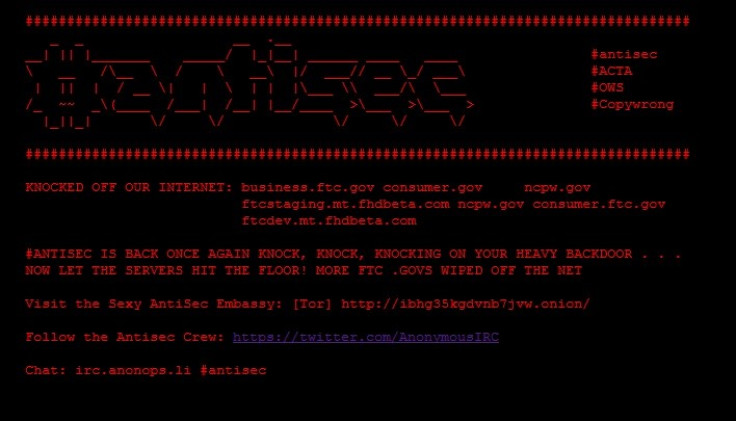Anonymous Hackers 'Protest' Acta Defacing Government Trade Sites

Continuing its anti-Acta "shenanigans" Anonymous hackers have targeted a number of government trade sites, defacing their front pages.
Word of the attack broke on Thursday when the collective targeted the ncpw.gov and consumer.gov websites. The attack saw the hackers replace the site's frontpages with its own anti-Acta statement.
At the time of writing the ncpw.gov site's frontpage still had Anonymous's message up. The statement clarified that the attack was a warning to the governments of the world, promising that should Acta be signed by all negotiating nations, further attacks would occur.
"If ACTA is signed by all participating negotiating countries, you can rest assured that Antisec will bring a f*****g mega-uber-awesome war that rain torrential hellfire down on all enemies of free speech, privacy and internet freedom. We will systematically knock all evil corporations and governments off of our internet," read Anonymous's statement.
The Anti-Counterfeiting Trade Agreement (Acta) is designed to harmonise copyright enforcement across all participating countries. The agreement has caused mass controversy, with many protest groups suggesting it could grant governments and corporations the power to censor the internet. As stated by Rik Ferguson, director of security research and communication EMEA at Trend Micro:
"The concerns with Acta centre mostly around how the bill enforces liability on website for any links that point to disputed content. In the world of User Generated Content, the potential for any site to be forced to close down, in a Stalinesque way to become a 'non-site' as it is obliterated from search results or even have its domain name seized, all as a result of the actions of its users, is seen as too great a threat to business online."
That said, analysts are not united in this belief. Speaking to the International Business Times UK Sophos analyst Graham Cluley said that the idea Acta will put in place controversial measures granting authorities powers similar to those seen in the US Stop Online Privacy and Protect Intellectual Property (Pipa) acts is premature.
"Whereas SOPA and PIPA are proposed US legislation (but with the ability to impact those of outside America), ACTA is an attempt to get international agreement in the fight against copyright infringement," commented Cluley. "Many of the initial provisions of ACTA (a broad ban on tools which can be used for copyright infringement, a 'three strikes' rule forcing ISPs to disconnect repeat offenders, etc) have been dropped or watered down."
© Copyright IBTimes 2024. All rights reserved.





